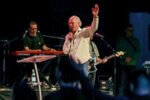Katrina MacNab’s friendship with many in the city’s growing Islamic community allows her to challenge them with the gospel
Egyptian Katrina MacNab from the interracial New Life Church in predominantly black Brixton, South London, spends many hours every day sharing the truth of the gospel with Muslims. A widow in her 40s, she challenges an aggressive Islamic mission campaigning successfully among both immigrants and black Londoners who have long-experienced Christianity as the “white man’s religion.”
Islam is growing rapidly in London, and England’s March census–for the first time mapping religious affiliation–is expected to confirm that the Muslim community in England has a democratic claim to more influence.
“The Muslim mission in the city is a very aggressive movement with the stated aim to conquer Europe for Islam,” said Brixton-based apostle Philip Mohabir, a former Hindu from Guyana, South America, who came to London in the 1950s to serve the uprooted black-immigrant community. Since then, he has planted more than 100 interracial, charismatic churches around the globe.
Mohabir, also the founder of the African-Caribbean Evangelical Alliance in England, told Charisma that racism in the church paves the way for the Muslim outreach to blacks. The black Brits who came to London from the colonies in the 1950s and 1960s were not welcomed by the white British churches even though they had been christened by British missionaries. Disillusioned, many left their faith.
In Brixton, which has a large black population, there are now 12 mosques. Mohabir is not discouraged by the growth of Islam in London. He calls it a “golden opportunity to evangelize Muslims.”
One of the initiatives of his own home church has been an evangelistic gathering place run by MacNab in a basement off the main road in Brixton.
In normal times the basement is quite busy, with Arabic spoken more often than English is.
During Ramadan, when the Muslim “faithful” abstain not only from food, but also from drinking coffee before 4 p.m., only a few Iraqi Kurds in search of legal assistance found their way to MacNab and her team. Local Quran teacher Sheik Mahmud, a native Nigerian, stopped by on his way to break the fast in one of the neighborhood mosques. He soon got hot on issues of holiness–such as women covering their heads.
Bareheaded MacNab responded with a friendly smile. It takes more than bickering to shake her.
She learned the evangelistic trade under tougher circumstances, as a medical student in Tunis, the capital of Muslim Tunisia, in North Africa. There, Christianity is an outlawed, underground movement. At age 20, MacNab–then a Roman Catholic believer–made contact with a local Pentecostal church.
“The pastor’s way of sharing the gospel with Muslims touched me deeply,” MacNab said.
Sharing the gospel with Muslims became a passion for her. After moving to London to study, she found even greater possibilities.
“With no need to work undercover I have been evangelizing in the streets on a daily basis the past 12 years–never encountering a problem, not even addressing Muslim men,” MacNab said. “After all, this is London!”
MacNab and her team invite Muslims to watch the Jesus film in their own language or to chat over a quiet cup of coffee. She offers Bible studies and Sunday worship in Arabic, as well as legal assistance and language training.
Each Tuesday night Brixton’s homeless are invited to dinner.
“The team has fed and housed and clothed a few hundred Muslims,” Mohabir said. “Still we have seen only some 50 converts. It is difficult to reach Muslims with the gospel in England.”
The Christian impact on the Muslim London is “small indeed,” he said, while the Muslim community keeps growing because of immigration and an aggressive missions thrust. Mohabir explains that the Islamic mission has a clear strategy, and lots of funds to back up the missionaries coming not only from the Middle East, but also from the United States.
In contrast, the modest Brixton gathering place might have to close in March for lack of funds. “Humanly speaking there is very little or no chance for us to turn the tide,” he said.
Nevertheless Mohabir envisions a revival of supernatural proportions. “The church has to become aware of the increasing Islamic presence and purpose and develop a passion to reach out to Muslims whatever the costs.”
Herti Dixon in London






Leave a Comment
You must be logged in to post a comment.